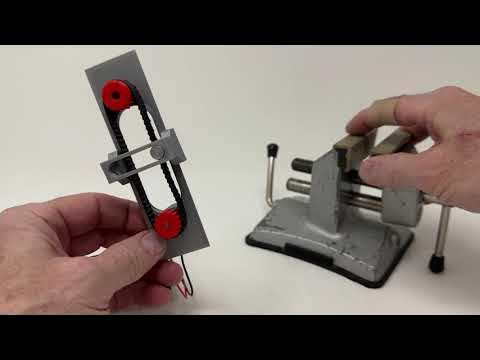Alt link: https://piped.video/watch?v=QI_R1EMU8yc
This video got posted today and is ideal for something I am working on right now.
The way this person posts is particularly useful for me. They are working on accessible isolated mechanisms that have many potential applications.
There are a lot of people making content where they show off some of their large projects like robots and radio controlled stuff, but I have never made any of these in practice. I don’t waste time on the printer social websites any more. It is almost always faster for me to design something properly, for 3D printing, where I control the clearances, eliminate the need for supports, and print it right the first time.
So, do you have any sources like this when it comes to mechanisms and inspiration where you’ve actually incorporated designs or concepts into your own designs?
Not exactly a follow but I find the Voron design team interesting. And the community around it such as the Klicky Probe, then the magnetic based unklicky and things like Voron tap.
All that is to say unique ways of figuring out the mechanics of a component and how they iterate it, find out what works, what’s reliable and so on.
I like some of Slant 3D’s stuff on different ways to account for FDM based prints in design even if he can oversimplify how elegant things are.
Kicky is a rabbit hole in iterative designs on the same idea. There’s also NGKlicky (no glue). Not to mention all the variations on door hinges, bed fans, filters…
The stock Voron designs also have tons of little quirks in them, like built in bridges for things with circular holes in them, to trick slicers into not printing in mid-air, that I’ve adopted into my own designs.
Also funny, the klicky itself is based on the work done leading into the quickdraw probes from Annex Engineering, the rabbit hole just gets deeper.
It’s fascinating isn’t it?
And you’ve got Tap. And then this…. Which is a work in progress but uses the actual flexture of the printed tool head mount and is adjustable via screws.
So many clever mechanical design concepts
I have been using a Precusion Piezo Orion probe for over 5 years now and it’s great. Also relies on parts flexing.
Here is an alternative Piped link(s):
Piped is a privacy-respecting open-source alternative frontend to YouTube.
I’m open-source; check me out at GitHub.
Mostly just makers and paying attention to how products in general are built. Anything else I find that people get too “clever” with their designs rather than developing an efficient solution. The key to being a good designer is being able to combine and apply simple mechanical principles into a design that efficiently solves the problem. Many people online skip the efficient aolution part in order to make the design look “cool” but is effectively useless for a anything practical.
Personally I lean on real-world designs, honestly I haven’t taken advantage of some of the things that additive manufacturing enables over traditional machining so pretty much anything I’ve done could be done on a mill + lathe as well. Do lean on reference material though, dusted off my machinery’s handbook for some gearing references recently and I don’t doubt that I’ll get use from some of my other textbooks from uni, dated as they are.
I went through prusa’s documentation on designing for 3d printing when I was getting setup again as it had been some time, that covered things like overhangs, horizontally oriented holes etc. With all that said, I’ve always been an iterative design person, sometimes that’s also iterating on existing work, really appreciate the open source mindset in the community for that.
Yes, I love gzumwalt!
Removed by mod
New Lemmy Post: Those that design: Who do you follow and what sources do you like for mechanical design inspiration? (https://lemmy.world/post/13038541)
Tagging: #3dprinting(Replying in the OP of this thread (NOT THIS BOT!) will appear as a comment in the lemmy discussion.)
I am a FOSS bot. Check my README: https://github.com/db0/lemmy-tagginator/blob/main/README.md






